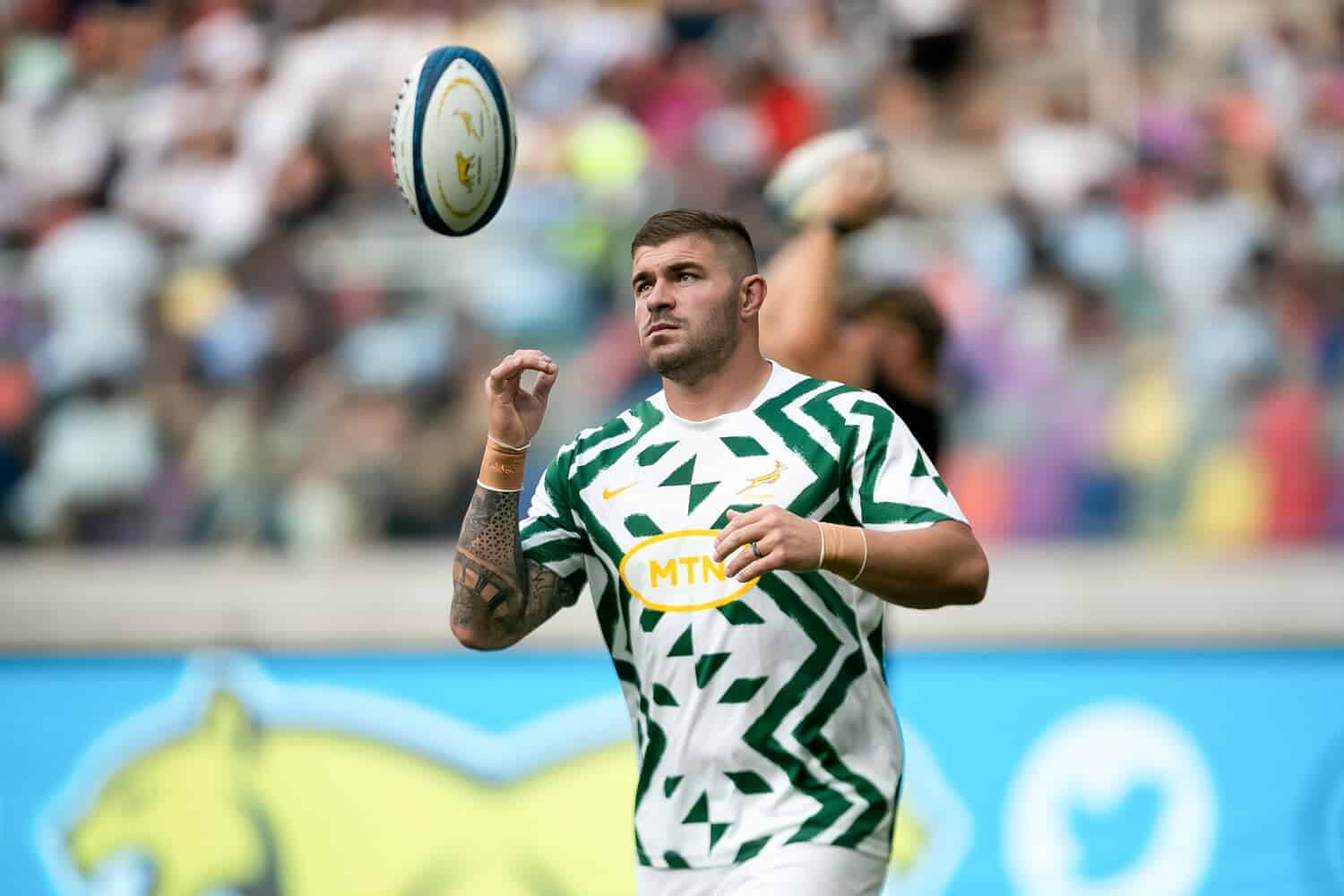On a cold Dublin night that felt like a culmination and a beginning all at once, Springbok hooker Malcolm Marx was named World Rugby Player of the Year 2025. The announcement arrived in the afterglow of South Africa’s 24-13 win over Ireland, a statement victory that doubled as a fitting canvas for Marx’s season. It also delivered history for South African rugby, with back-to-back Bok winners for the first time after Pieter-Steph du Toit’s triumph last year.
The scene spoke to rugby’s soul. Victor Matfield stepped into the changing room to hand Marx the award, minutes after the hooker had bossed the set piece and collected player of the match. It was the kind of night that binds performance to recognition, a reminder that the best accolades often arrive in the places where sweat still lingers and the roar is still echoing.
A night in Dublin that told the story
Against Ireland, Marx was part of a front row that pressed and persisted, squeezing penalties and territory as the visitors broke a 13-year wait for a win in Ireland. He did not need fireworks, just an iron grip on the details that decide Test matches, and that is where he thrived, from scrum platform to lineout rhythm. In the moments that mattered, the Springboks leaned on their core, and Marx stood at the center of it.
His performance came layered with meaning. To be named player of the match and then World Rugby’s best men’s 15s player in the same breath felt like a verdict on a season of tireless contribution. It was also a reminder of his reach beyond one game, because this award was built over months of heavy lifting.
From World Cup heartache to a relentless response
The most compelling strand of Marx’s year is the one that began with pain. He played only about 52 minutes at the 2023 Rugby World Cup, helping set the tone against Scotland, then a serious knee injury in training forced him home. Handré Pollard replaced him in the tournament squad and did not miss a single kick, a subplot that became legend. For Marx, the absence became fuel.
“Watching from home wasn’t the greatest experience, but I am not the first and won’t be the last guy who will have an injury like that. Just watching them play well gave me a bit of drive to get back on field and contribute as much as I can when I do get the opportunity.”
That drive shaped every facet of his 2025. The double World Cup-winning hooker turned disappointment into a craft sharpened by focus, and the Springboks benefited in every collision and contestable ball.
The resume that won the vote
The numbers and milestones carry a quiet authority. Marx started all 12 Tests he played in a 14-match Springbok season and scored six tries with one fixture to come. The influence ran deeper than dots on the board, living instead in a dominant scrum and a clean, confident lineout. His defensive work and jackal threat tied the bow on a complete picture.
Two tries arrived in the Rugby Championship decider against Argentina, a 29-27 thriller, where his timing and power swung momentum. He was brilliant in loose play and lineouts during South Africa’s 14-man 32-17 win over France in Paris, a result that felt like a cultural reaffirmation of Springbok resilience. Then came Dublin, a 24-13 win built on set-piece supremacy, where Marx’s fingerprints were everywhere.
He was not flawless, and that matters in any honest appraisal. In the first half of the season he took responsibility for misfiring lineouts, a rare wobble that he corrected with the diligence that defines his career. The arc of his year bends toward improvement under pressure, which is often the standard that separates nominees from winners.
What makes Marx different
His game remains anchored in parts of the field that are both technical and emotional. The scrum is a test of will married to technique, the lineout is choreography under stress, the breakdown is calculation wrapped in chaos. Marx turns these moments into a platform, then adds carries that sap defenders and a presence that lifts teammates. In a sport where Trust beats Hype, his strengths hold up on repeat.
Against Ireland he rotated through combinations that underlined the Springboks’ depth. The first half featured Boan Venter and Thomas du Toit alongside him, then Gerhard Steenekamp and Wilco Louw took over, and the pressure hardly dipped. Marx acknowledged the grind and gave full credit to the opposition for hanging on as long as they did.
“It was a tough game and having that many scrums wasn’t pleasing on the neck, but they are a quality side with a quality pack. We had to grind it out and apply as much pressure as we could to get the rewards.”
The field he had to beat
This was not an award won in a vacuum. Pieter-Steph du Toit, himself World Rugby player of the year in 2019 and 2024, offered season-long consistency that many argued deserved a historic third crown. Ox Nché, the first prop ever nominated, powered much of the scrum dominance before injury against Japan interrupted his charge, a twist that perhaps cost him momentum.
France’s Louis Bielle-Biarrey brought highlight-reel flair, scoring eight tries in the Six Nations and two more in the Autumn Series. His case was strong, even if team inconsistency proved a headwind by year’s end. Marx edged this group because his influence was felt at the source of Springbok strength, and because in tight games he produced moments that tilted the scoreboard.
- His two-try contribution against Argentina in a title decider,
- his lineout control and loose play impact during the 14-man win in Paris,
- his player of the match performance in Dublin that sealed Ireland’s first home loss to the Boks since 2012.
A team man to the core
Marx’s response to the award was classic Springbok humility. He redirected the praise to the setup, from coaches to players, and even admitted he hoped the accolade would land with a teammate.
“None of this is achievable without the environment and the team that we have got. Management, players and everyone involved. So this award isn’t just necessarily for me, I think it’s a team award and an award for South Africa.”
He name-checked Ox Nché and Pieter-Steph du Toit as preferred winners, a gesture that says as much about the Bok culture as it does about Marx. The hooker often describes a family environment within the national team, where everyone minds each other and aims for a single target, to be the best.
Recognition for a collective
SA Rugby’s leadership echoed the theme. Alexander praised Marx’s work ethic and the values he embodies, calling the award a fitting recognition of his contribution to the team and to the sport. He also highlighted the remarkable footprint South Africans had across the shortlist, with three of the four men’s 15s nominees and a breakthrough nominee all wearing green and gold. It was less a boast and more a snapshot of depth and standards.
The broader awards painted an international picture. Nché’s selection as the first prop ever nominated felt like an overdue nod to the dark arts of the front row. South Africa’s Ethan Hooker reached the shortlist for Breakthrough Player of the Year, with New Zealand’s Fabian Holland taking the prize. Chile’s Santiago Pedrero claimed Try of the Year, while John Mitchell was named coach of the year, a reminder that rugby’s excellence crosses continents.
History and the weight of the jersey
Marx became the fourth South African to win the men’s 15s crown, joining Schalk Burger in 2004, Bryan Habana in 2007, and Pieter-Steph du Toit in 2019 and 2024. He was previously nominated in 2018 and took home SA Rugby’s men’s player of the year in 2017, signposts along a road that has now reached its brightest point.
There is symmetry in the back-to-back recognition for the Springboks. It points to a program that has grown comfortable carrying expectation, and to a core of leaders who set standards daily. Marx is one of them, a hooker who plays more like a compass, steadying the needle in storms.
The toll and the gratitude
By his own admission, the season has been long and hard. He played in 12 of the Springboks’ 14 Tests, starting every one he featured in, staying on the field for more than 70 minutes several times, most notably in victories over France and Ireland. The body is battered and bruised, yet the voice stays thankful, the commitment intact.
“Any opportunity that I do get to be in this environment and with this team I will grab with both hands. Because you never know when it’s going to end.”
Reports suggested he may receive a well-deserved rest for the final match of the year against Wales, a sensible nod to the workload he has carried. Whether he plays or not, his impact is already stamped on the season.
What the award really says
Strip away the confetti and the cameras, and the message is simple. This is recognition of a player whose influence sits at rugby’s coalface, where games are won and reputations minted. It is also a salute to a Springbok pack that dominated key contests, and to a culture that breeds accountability and humility.
It does not erase the claims of others. Du Toit’s consistency made a strong case. Nché’s early-season force was award calibre before injury intervened. Bielle-Biarrey dazzled as a finisher of rare instincts. The award instead lands like a verdict on decisive moments and sustained influence across the biggest stages, where Marx repeatedly showed up.
From debut dreams to leadership reality
Marx still speaks with warmth about his 2016 debut against New Zealand, calling it unforgettable and a driving force in his career. He has since become a 2019 World Cup winner and, as SA Rugby framed it, a standard bearer for resilience, commitment and character. The progression feels linear, yet the road has been anything but smooth, shaped by setbacks that he turned into momentum.
That is the essence of his 2025, the conversion of heartache into output, and of pressure into clarity. The Springboks needed a hooker who could be a force in the trenches and a heartbeat in the huddle. Marx gave them both.
The last word
Recognition often lags behind reality. For the Springboks, the reality has been a season of heavyweight contests decided by inches, by scrums that do not retreat, by lineouts that find their mark. For Malcolm Marx, the reality is a year in which he set a tone and then kept it, one carry, one tackle, one throw at a time.
World Rugby’s top individual honor crowns that body of work. It is also, as he said, an award for South Africa. The team-first framing is not a pose, it is a philosophy. In 2025, it also became a pathway to the sport’s highest stage, with a hooker leading the way and a nation nodding in agreement.






